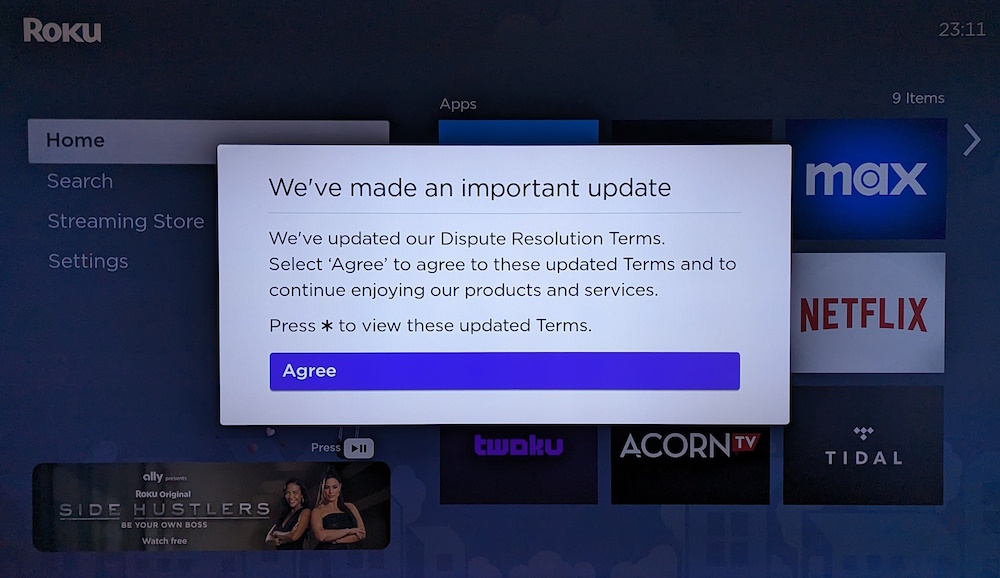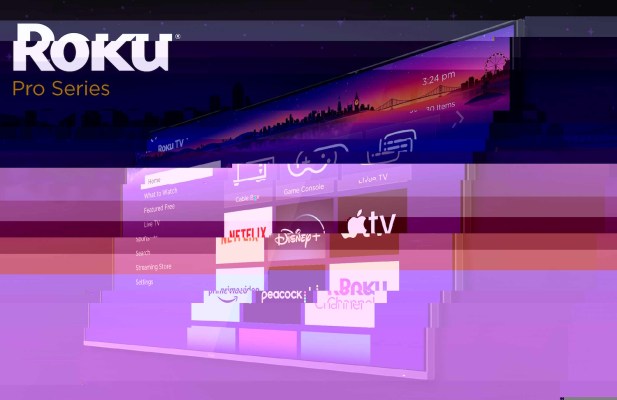Roku users around the country turned on their TVs this week to find an unpleasant surprise: The company required them to consent to new dispute resolution terms in order to access their device. The devices are unusable until the user agrees.
Users (at least, this user) received an email the day before saying that “we have made changes to our Dispute Resolution Terms, which describe how you can resolve disputes with Roku. We encourage you to read the updated Dispute Resolution Terms. By continuing to use our products or services, you are agreeing to these updated terms.”
The terms, of course, include a forced arbitration agreement that prevents the user from suing or taking part in lawsuits against Roku. It’s common these days as a way of limiting liability, and users often have little or no recourse. They only find out later, when the company does something heinous and consequences are negligible. Tech companies love this one dirty trick to save millions! (Full disclosure, our parent company requires arbitration as part of its dispute resolution policy as well.)
But what is actually new on perusal of the terms is a whole “Informal Dispute Resolution” section. This requires anyone with legal complaints to take them to Roku lawyers first, who will conduct a “Meet-and-Confer” call and then “make a fair, fact-based offer of resolution” that will no doubt be generous and thoughtful. So they’ve added a pre-arbitration arbiter to further distance legal threats from materializing. The change was actually made last fall (though no notification appears to have been sent out) but only came into effect recently, and now, some weeks later, users are being informed by this questionable method.
I try to opt out of these when I can, and after reading the terms (to which, of course, by “continuing to use” my TV, I had already agreed), I found that you could only do so by mailing a written notice to their lawyers — something I fully intended to do today. Actually, since arbitration was apparently already required, this update provides an opportunity to opt out of something I didn’t know I was already subject to.
But yesterday I turned on the TV and saw the notice again, as did countless others (some saw it a few days ago), who quickly took to the forums to complain. I accidentally agreed (again . . . I think) by hitting the star button to view the terms and then hitting back, by which I intended to look for a way out, but of course there was none. There was no accessing the device without agreeing to the new terms.
Interestingly, the terms themselves haven’t changed in a long time. Here’s how it looked to anyone just trying to watch the new episode of “Shōgun” (great so far):

Image Credits: Roku Forums/AJCxZ0
That’s from forum user AJCxZ0; hope you don’t mind.
Not that this is so uncommon. After all, we constantly are using apps and games that present us with new end-user license agreements (EULAs) and terms and conditions. I probably have ignored a dozen and exposed myself to untold dangers here. But there really is something rather despicable about totally disabling a user’s device until they agree, and having basically anything the user does count as agreement. Many phones, apps, and services let you continue using them for some time or restrict you to the current version until you agree.
Unfortunately, that isn’t the case here. As of right now, I am bound by this new agreement. I’ll still be opting out, and you should too — but you’ll have to move fast. You can only do so within 30 days of the new terms coming into force upon you. That may be when you were notified, but it may also be on March 20, which is 30 days after they nominally (and silently) went into effect, on February 20. So grab a pen and paper and jot down the following information:
- Name of person opting out.
- Contact information (address and phone number, probably).
- Email used to register Roku account if applicable.
- Product model, software, or service “at issue” — for example, your TV or streaming stick’s model number. May as well list Roku OS as well.
- If you have a receipt, you can include it but it isn’t necessary, apparently.
Even though they already have that. Stick that in an envelope and send it to:
- Stephen Kay, General Counsel, Roku, Inc.
1701 Junction Court, Suite 100
San Jose, CA 95112
Thanks in advance, Stephen. Though in retrospect, I — and literally every single user of your company’s services — would have preferred a straightforward electronic opt-out instead of this dishonest ploy to increase friction and further coerce adoption of these terms.
Don’t delay; otherwise, when people sue them over how they held devices hostage in order to coerce them into consumer-hostile dispute resolution terms, you won’t be able to join in on the fun. It’ll just be the 35 or so of us who still have pens, paper, and envelopes in easy reach who will reap the benefits.
Update: My mistake, arbitration terms were already in place, but informal dispute resolution terms were not. But the devices were, in fact, inaccessible until users agreed to the terms, which silently came into effect two weeks ago. I’ve updated the post throughout to reflect this.
Roku declined to provide a statement on the record, though they did point out that arbitration was already in the terms. I have asked some follow-up questions and will update again if I hear back.
